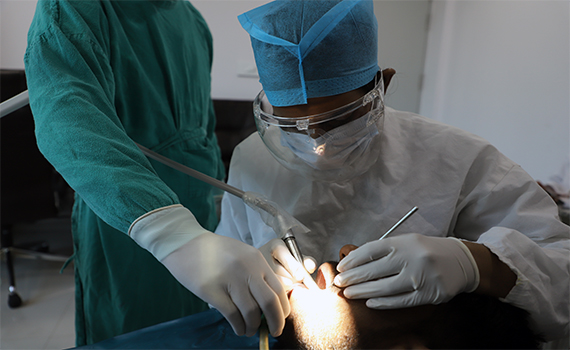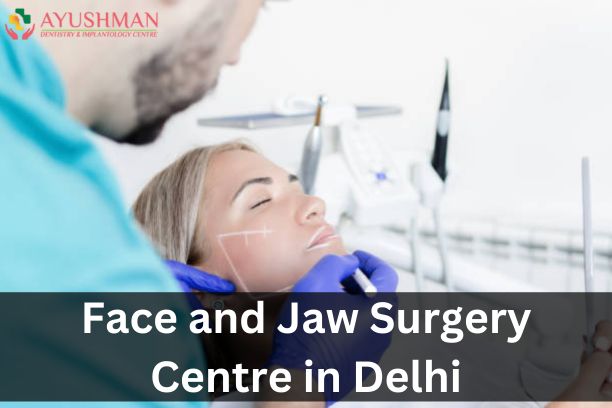Jaw Surgery
Jaw Surgery In Dwarka
suffering from jaw pain or misalignment? Ayushman Dentistry offers Jaw Surgery in Dwarka for a healthier, more confident you.
If you have broken teeth or a broken jaw at Ayushman Dental Clinic, get instant jaw surgery. We have one of the most qualified jaw surgery dental experts who provides an elegant jaw surgery treatment. Jaw surgery is also called orthognathic surgery. This surgery helps align your upper and lower jaws to fix them.

Book an Appointment
01. What Is Jaw Surgery?
Jaw surgery, or orthognathic surgery, is a medical procedure that aims to correct issues related to the jaw and facial structure. It involves the realignment of one or both jaws to improve their functionality and overall appearance. This procedure is often performed by oral and maxillofacial surgeons, who are experts in treating conditions affecting the mouth, jaws, face, and neck.
02. Why Is Jaw Surgery Needed?
There are several reasons why someone might need jaw surgery:
Malocclusions: Malocclusions are problems with the alignment of the teeth and jaws. These issues can affect your ability to bite, chew, and even speak properly.
Breathing Difficulties: Severe jaw misalignments can lead to obstructive sleep apnea and other breathing problems.
Facial Imbalance: Jaw surgery can improve facial proportions and overall appearance for those with noticeable jaw discrepancies.
Chronic Jaw Pain: Conditions like temporomandibular joint (TMJ) disorders can cause persistent jaw pain and discomfort, which jaw surgery can alleviate.
Difficulty Chewing or Swallowing: Misaligned jaws can make eating and swallowing challenging, affecting both nutrition and quality of life.
The Jaw Surgery Process:
03. Consultation
The journey begins with a consultation with an oral and maxillofacial surgeon. They will assess your condition through physical examination, X-rays, and sometimes even 3D imaging to understand the extent of the problem.
Treatment Planning: Based on the assessment, the surgeon will develop a personalized treatment plan. This plan will outline the specific surgical procedures needed to correct the jaw misalignment.
Preparation: Before the surgery, you'll receive detailed instructions on how to prepare. This may include adjustments to your diet, medications, and lifestyle habits.
Surgery: The actual surgery takes place in a hospital setting. The surgeon will make precise incisions to access the jawbone and may use plates, screws, or wires to reposition the jaw.
Recovery: After the surgery, you'll need time to recover. Swelling and discomfort are common, and your surgeon will provide guidelines on pain management, eating soft foods, and maintaining oral hygiene.
Follow-Up: Regular follow-up appointments are crucial to monitor your healing progress. Your surgeon will ensure that your jaws are healing properly and that you're on track to achieving the desired results.
04. Benefits of Jaw Surgery:
Improved Functionality: Correcting jaw misalignments can significantly enhance your ability to chew, speak, and breathe properly.
Enhanced Appearance: For those with noticeable jaw discrepancies, jaw surgery can greatly improve facial symmetry and harmony.
Pain Relief: If you've been experiencing chronic jaw pain due to misalignments, surgery can provide relief and improve your quality of life.
Boosted Confidence: A balanced facial structure can lead to increased self-confidence and a positive self-image.
Recovery and Aftercare:
Recovery after jaw surgery requires patience and adherence to your surgeon's instructions. Some tips for a smooth recovery include:
Pain Management: Your surgeon will prescribe pain medications to manage discomfort during the initial days of recovery.
Diet Modifications: Stick to a soft food diet during the early stages of recovery to avoid putting unnecessary pressure on your healing jaws.
Oral Hygiene: Maintaining proper oral hygiene is crucial. Your surgeon might recommend gentle rinses or special cleaning techniques.
Follow-Up Appointments: Regularly attend follow-up appointments so your surgeon can monitor your progress and address any concerns.
05. Who Is a Candidate for Jaw Surgery?
Not everyone with jaw issues requires surgery. Candidates for jaw surgery typically have:
Severe malocclusions that can't be corrected with orthodontic treatment alone.
Difficulty chewing, speaking, or breathing due to jaw misalignments.
Facial imbalances that impact self-esteem and quality of life.
Chronic jaw pain or TMJ disorders.




